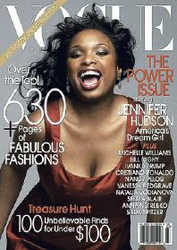Insight and acceptance coming
 Opening minds and hearts and bringing rationality to a culture overwrought by weight angst can come from the most unexpected places. Vogue Magazine, long the fashion industry’s visible promoter of one idea of beauty and the thin body size-ideal is changing its ways. For only the third time in its 115-year history, an African American will be depicted on the cover. But the even bigger revolution with this cover is that it will show a lovely women with a natural, full-figure. She is more typical of most women who average 5-foot 4-inches and wear a size 14. Hopefully, an appreciation for the natural diversity among all women will soon follow.
Opening minds and hearts and bringing rationality to a culture overwrought by weight angst can come from the most unexpected places. Vogue Magazine, long the fashion industry’s visible promoter of one idea of beauty and the thin body size-ideal is changing its ways. For only the third time in its 115-year history, an African American will be depicted on the cover. But the even bigger revolution with this cover is that it will show a lovely women with a natural, full-figure. She is more typical of most women who average 5-foot 4-inches and wear a size 14. Hopefully, an appreciation for the natural diversity among all women will soon follow. Samanth Thompson Smith at the News Observer reports:
You might want to save that next issue of Vogue. "Dreamgirls" star Jennifer Hudson is on the cover. Sure, it's noteworthy because she's only the third African-American woman on the cover in the magazine's 115-year-history. But look again. This is Vogue, the fashion magazine with unprecedented power to sway fashion trends and where skinny girls -- the size 0s or 2s without round hips, big butts, or God forbid, voluminous cleavage -- historically have been considered the most beautiful.
Now it seems Vogue's editor, Anna Wintour, who has been so notoriously size-conscious that she even asked Oprah Winfrey to lose weight before appearing on the cover in October 1998, has new ideas about weight. With Hudson on the cover, Vogue's new full-size message, not only to the millions of people who live for the magazine's style insight but to the weight-obsessed fashion industry, is that too-skinny might soon be so last season.
But for Vogue, which sets fashion tones and influences style around the world, taking this step likely will have a broader impact..... Cynthia Bulik, a UNC professor of eating disorders and director of the school's Eating Disorders Program...says the impact of Hudson on the cover will be significant among teenagers and young women who read the magazine. "We're looking for healthy and diverse role models for girls," she says. "We don't want eating disorders to be glamorous. We don't want ultra-thinness to be glamourous."....
Talley says: "We're sending a message to people that you can be all you can."




<< Home